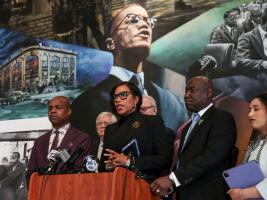Fat stigma is rooted incolonial-era race science, and specifically in anti-blackness, says the author.
“It is important for us to remember just how much of what passes for “classical” beauty is rooted in white supremacy.”
In this series, we ask acclaimed authors to answer five questions about their book. This week’s featured author is Sabrina Strings. Dr. Strings is Assistant Professor of Sociology at the University of California, Irvine. Her book is Fearing the Black Body: The Racial Origins of Fat Phobia.
Roberto Sirvent: How can your book help BAR readers understand the current political and social climate?
Sabrina Strings: The book serves as a reminder that many of the taken-for-granted ways of knowing and doing are rooted in colonial-era race science, and specifically in anti-blackness. We are in a climate of growing social awareness about the ills of fat phobia, and how such phobia routinely besets black women and other folx from marginalized groups. And yet, what often appears to undermine the critical force of these arguments in the mainstream are seemingly apolitical claims about “health.” My book works to uncover how such claims are politicized. Racializations and genderings of the body, and especially sexism and anti-blackness, have been integral to notions of health and illness.
What do you hope activists and community organizers will take away from reading your book?
I hope my book can be a bulwark against claims commonly made that the cultural aversion to fatness is rooted in an ethics of care. That is, people like to claim that fat stigma is rooted in concerns about the ill-health of obese persons, and that the desire to see them lose weight is really for their own good. My book shows that fat stigma precedes medical concerns about the ill effects of “excess” weight by more than a century. And, it was mostly a way to cordon off racial “others” from polite white society.
We know readers will learn a lot from your book, but what do you hope readers will un-learn? In other words, is there a particular ideology you’re hoping to dismantle?
We are trained to link health to body size. This is one of the main things I hope that people will start to un-learn. But, at the same time, I’d also like for people to re-learn a few things. We have also been trained to un-think the centrality of anti-blackness to our conceptions of beauty. There are several pages in the book where I am showing how white men and women made direct and unfiltered commentary about the physical unattractiveness of black women and related their undesirability to their skin color and body size. Many of these same white people would claim the beauty of white skin, and svelte forms. Today, of course, white people rarely talk so openly about race and whiteness. But, it is important for us to remember just how much of what passes for “classical” beauty is rooted in white supremacy.
Who are the intellectual heroes that inspire your work?
Can anything in black feminist theory be written without bell hooks? Audre Lorde? Toni Morrison? I also feel deeply indebted to Angela Davis. Her presence as a scholar, radical, and spiritual figure is inspiring in all its manifestations. Roderick Ferguson’s work on how black bodies are continually pressed into capitalist and hetero-patriarchal service is always resonant. I think also of Zora Neale Hurston. Her works illuminated for me an aspect of the black experience that I’d never heard anyone speak about. She described racial and gendered relations in a way I’d never considered. The honesty about the black experience in her work (fiction and non-fiction) is a model for the kind of truth telling I’d like to do as a writer.
In what way does your book help us imagine new worlds?
It’s hard to argue against “science.” When people start talking about black women’s embodiment and degradation, oddly there’s always a scientific explanation marshaled to explain why said degradation is par for the course. At one point it was race science. Now, too often, it’s medical science. The book reminds us that for all its claims to objectivity, “science” is a discourse being promoted by powerful individuals. Frequently, they have a vested interest in maintaining the status quo. The book can be seen as a challenge to the view of science as “objective” or the mechanism by which we may necessarily “progress.”
If we don’t have to rely on the scientific method to generate knowledge, and specifically knowledge about marginalized groups, what other ways of knowing become available? The book doesn’t explicitly call for alternative medicine, community medicine, local foods or slow foods. But, I hope that by working to dismantle the obesity = ill health equation—which demands that we encourage low-income communities and communities of color to focus on weight management—that it leaves more space for conversations about non-traditional, not-necessarily “scientific” means of generating better health outcomes for our communities to become more visible and viable.
Roberto Sirvent is Professor of Political and Social Ethics at Hope International University in Fullerton, CA. He also serves as the Outreach and Mentoring Coordinator for the Political Theology Network. He is co-author, with fellow BAR contributor Danny Haiphong, of the new book,American Exceptionalism and American Innocence: A People’s History of Fake News—From the Revolutionary War to the War on Terror.
COMMENTS?
Please join the conversation on Black Agenda Report's Facebook page at http://facebook.com/blackagendareport
Or, you can comment by emailing us at comments@blackagendareport.com



















